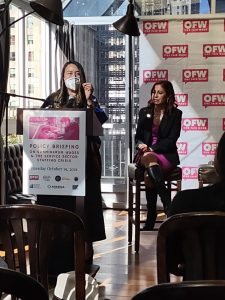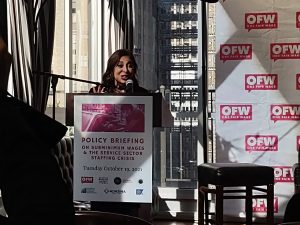- A
- A
- A

FOR IMMEDIATE RELEASE: Tuesday October 19, 2021
Contact: Zach Garafalo, Manager of Government Affairs, Center for Disability Rights, zgarafalo@cdrnys.org, 518-727-4668
THE CENTER FOR DISABILITY RIGHTS AND ONE FAIR WAGE COALITION CALL ON GOVERNOR HOCHUL TO USE EXECUTIVE AUTHORITY TO END SUBMINIMUM WAGES IN NEW YORK STATE
Manhattan: The Center for Disability Rights joins One Fair Wage and calls on Governor Hochul to address subminimum wage by ending the flow of state tax dollars to organizations that have exemptions from minimum wage laws that allow them to pay Disabled people pennies on the dollar.
An exemption from paying minimum wage to persons with disabilities has existed for many years in section 14(c) of the Fair Labor Standards Act of 1938. Historically, this minimum wage exemption was considered necessary to help people with disabilities gain employment, however, experience has demonstrated that workers with disabilities succeed in jobs earning minimum wage or more.
Multiple states have already ended this ableist practice, including Alaska, Maine, Maryland, New Hampshire, Oregon, Washington, Hawaii and Colorado. Recently, the Governor of Illinois addressed this issue through an Executive Order, however, instead of taking action to end this ableist policy, New York State actively contracts with organizations holding these certificates. Today, advocates for workers and disability rights advocates are calling on Governor Hochul to issue executive orders ending subminimum wages for Disabled people and tipped workers[1] at the Kimberly Hotel in Manhattan.
“Something happened during the pandemic. We are on the cusp on changing something that has been affecting workers for the past 150 years. Some people call it the great resignation. We prefer to call it the great rebellion. Workers are standing up and saying we just can’t put up with it anymore,” said Saru Jayarma, President of One Fair Wage. Subminimum wage cannot be understood as anything other than a devaluation of black lives and women’s work. And that devaluation became part of federal law in 1938.”
“Paying workers – including workers with disabilities – a subminimum wage is structurally ableist and racist,” said Bruce Darling, President and CEO of the Center for Disability Rights. “The subminimum wage for people with disabilities was established 83 years ago. The world has changed a lot since then. Today, we understand the devastating impact that this policy has on people with disabilities who are segregated from their peers and not paid a fair wage. It’s time to end this legalized form of discrimination and oppression,” said Darling.
According to the US Commission on Civil Rights, more than 100,000 Disabled workers have been subjected to subminimum wages, averaging an estimated $3.34 an hour, with more than 50% earning less than $2.50 per hour. Disabled people – and particularly BIPOC Disabled people – are disproportionately oppressed and impacted by low wages and non-meaningful employment. At today’s policy briefing, Tony Phillips, a Disabled Black man said, “I worked in a sheltered workshop for less than a dollar an hour. What can you do with a dollar? I’m giving back to the community but nobody talks about me!” Phillips, a self-advocate who worked in a sheltered workshop for many years continued, “”My friends tell me, ‘Tony, why don’t you just stay home and collect SSI?’ I’m like, what? I can’t live like that. I want to work. If you don’t make a dollar, you don’t have a life.”
“Governor Hochul has the power to issue an Executive Order ending state contracts with organizations holding these 14(c) certificates,” said Zach Garafalo, Manager of Government Affairs. “She can give these organizations two years to divest themselves of these free passes to oppress people with disabilities, but they need to be put on notice now that this must end. Governor Hochul can pivot from our state’s ableist past and afford New Yorkers with disabilities the rights that many others take for granted.”
-30-
[1] https://onefairwage.site/newyork

Assemblymember Yuh-Line Niou speaking at the One Fair Wage Policy Briefing on Subminimum Wages and the Service Sector Staffing Crisis at the Kimberly Hotel.

Self Advocate Tony Phillips speaking at the One Fair Wage Policy Briefing on Subminimum Wages and the Service Sector Staffing Crisis at the Kimberly Hotel.

State Comptroller Tom DiNapoli speaking at the One Fair Wage Policy Briefing on Subminimum Wages and the Service Sector Staffing Crisis at the Kimberly Hotel.

Assemblymember Jessica Gonzalez-Rojas speaking at the One Fair Wage Policy Briefing on Subminimum Wages and the Service Sector Staffing Crisis at the Kimberly Hotel.

NYT Food Critic Mark Bittman speaking at the One Fair Wage Policy Briefing on Subminimum Wages and the Service Sector Staffing Crisis at the Kimberly Hotel.

Ifeoma Ezimako speaking at the One Fair Wage Policy Briefing on Subminimum Wages and the Service Sector Staffing Crisis at the Kimberly Hotel.